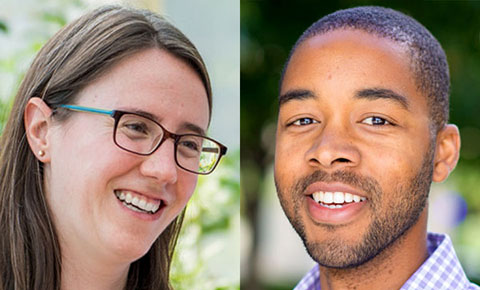These Two Rising Stars Won Early CAREER Awards

Northwestern University’s Eleanor O’Rourke and Marcelo Worsley received the prestigious Faculty Early Career Development (CAREER) Award from the National Science Foundation (NSF) for projects designed to strengthen and diversify the field of computer science.
O’Rourke, assistant professor of learning sciences in the School of Education and Social Policy and computer science in the McCormick School of Engineering, will receive $597,870 over five years to help students excel in beginning programming courses, which could help keep them interested in the field. Specifically, she’ll develop and implement “smart” programming environments that adapt and support students as they learn the craft.
Worsley will receive $532,247 over five years to research and implement a program that helps student athletes of color see the relevance between computer sciences and sports, which he hopes will broaden the field.
“Sports participation can be an asset for learning computer science,” said Worsley, who like O’Rourke has a joint appointment in learning sciences at SESP and computer science at McCormick. “We just have to help students make the connection.”
SESP has had a CAREER winner for three years in a row, and it's the fourth time the School has had at least two recipients in a single year. Overall, SESP has had 13 winners since 2011. Other recent young School of Education and Social Policy faculty and alumni who have been honored include Yang Qu and Janet Walkoe (PhD13) of the University of Maryland (2020), and Sepehr Vakil (2019).
Read more about each project:
Eleanor O’Rourke
Rising enrollment in computer science classes make it difficult for instructors to individually monitor a student’s progress and offer feedback until the very end of the process—which is often too late to help. O’Rourke will use her NSF grant to create a system that assess and adapts to how the student is doing in real time. Getting immediate feedback can increase motivation and help students develop more effective programming skills, O’Rourke noted in her proposal.
Her project, “Towards Intelligent Learning Environments that Support the Practice of Programming,” includes creating online workshops to help computer science instructors understand what motivates students. The training sessions will also include new courses for graduate students who plan to become computer science instructors, and research opportunities for students who are underrepresented in computer science.
O’Rourke is a co-director of the Delta Lab, Northwestern’s first interdisciplinary research lab and design studio. Her research is broadly focused on understanding how technical systems can support learning. She uniquely bridges the fields of human-computer interaction, the learning sciences, educational psychology, and artificial intelligence.
Marcelo Worsley
In the first phase of Worsely’s project, “Designing for Learning at the Intersection of Sports, Analytics and Physical Computing,” researchers will interview coaches and athletes to learn how they perceive the field of computer science and how youth sports programs are already using technology.
With that data, the researchers will design new tools and activities designed to get more athletes interested in studying computer science. Participants in after-school and summer enrichment programs–including both athletes and coaches–will learn about designing sports wearables, machine learning, and data science. The research team, meanwhile, will use artificial intelligence to assess the impact of the trainings.
“By tapping into the large number of young people participating in sports, we hope to create a possible strategy for broadening participation among athletes of color in computer science,” Worsley said.
Worsley directs the Technological Innovations for Inclusive Learning and Teaching (TIILT) Lab, which develops educational and technological solutions that support inclusive learning among underserved populations in hands-on, collaborative environments.
The CAREER Award is designed to support promising young faculty members who exemplify the role of teacher-scholar through the combination of outstanding research and education.
SESP Faculty and Alumni Early Career Development (CAREER) Awards
2021: Eleanor O’Rourke, Northwestern University
2021: Marcelo Worsley, Northwestern University
2020: Yang Qu, Northwestern University
2020: Janet Walkoe (PhD13), University of Maryland
2019: Sepehr Vakil, Northwestern University
2016: Melissa Luna (PhD13), West Virginia University
2015: Michael Horn, Northwestern University
2015: Ben Shapiro (PhD09), University of Colorado, Boulder
2014: Michelle Wilkerson (PhD12), University of California, Berkeley
2013: Pratim Sengupta (PhD09) University of Calgary
2011: Victor Lee (PhD08), Stanford University
2011: Ravit Golan Duncan (PhD06), Rutgers University
2011: Paulo Blikstein (PhD09), Columbia University